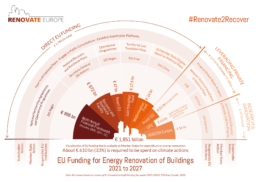
The European Regional Development Fund (ERDF), Cohesion Funds (CF) and the European Social Fund Plus (ESF+) can make a big difference for buildings renovation. But the Operational Programmes must be designed and implemented in a way that creates and sustains a renovation market for the longer term, beyond the “cliff-edge” end of the programming period.
We strongly urge Member States to consider the Key Recommendations on how to channel MFF funding effectively towards energy renovation in the Operational Programmes, namely by:
- Ensuring coherence with EU long-term climate objectives
- Avoid programmes funding single measures
- Scale the aid according to quality and ambition of the renovation project
- Attracting and leveraging private financing
- Limit the use of grants
- Favour lower support intensity
- Modulate the level of the aid rate to increase the leverage of private funding
- Encourage blended finance, combining Financial Instruments with grants
- Establish continuous calls
- Complementing and/or boosting national regulatory and funding initiatives already underway
- Maximise coherence with the national ambitions on buildings
- Facilitate MFF coordination with national funding schemes
- Ensure better coherence/integration of programs for energy renovation with those on renewable energy in buildings
- Streamline the administrative process at national level
- Maximising Programme Implementation
- Ensure sufficient allocation for Technical Assistance
- Ensure MFF-supported training programmes
- Complement the funding with an information campaign
- Better tracking and data collection
- Encourage digitalization
The buildings sector is a sector of enormous economic potential, creating local jobs and reducing citizens energy bills – all the while reducing greenhouse gas emissions and slashing Europe’s dependence on foreign imports.
Read our recommendations more in detail here.

